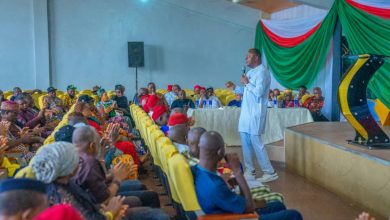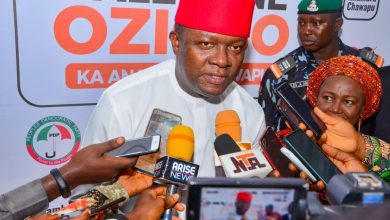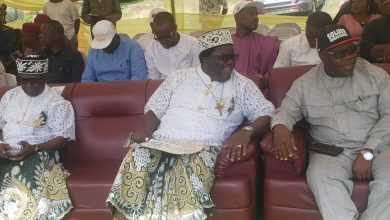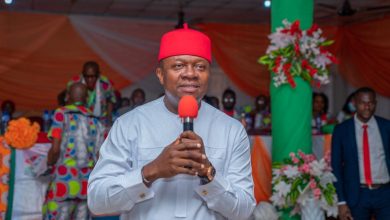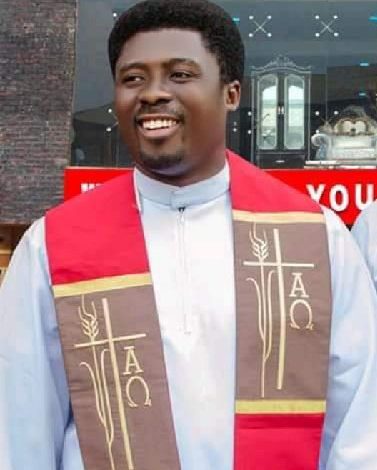
Rev Fr. Obimma Emmanuel (Ebube Muonso) is the Spiritual Director of the Holy Ghost Adoration Ministry, Uke, and the Rector, Blessed Iwene Tansi Pilgrimage Center, Umudioika, both in Anambra State. In this interview, he speaks about the 2023 presidential election, and the need to pacify the Southeast region. Excerpts
What is your view about the agitation for Nigeria president of Southeast extraction come 2023?
Equity and justice demand that this time around, the presidency should be zoned to the Southeast. This is one major step that I believe will put an end to the series of agitations. It is worrisome that a Southeasterner has not been elected into power as president of this country.
There is this perception that other tribes still look at the Igbo man with suspicion because of agitations?
The Igbo man wants the unity and peaceful co-existence of this country more than other Nigerians. This is because; the Igbo have a very big stake in the country, since they have investments in every nook and cranny of this country. Again, the Igbo man is a peace loving person. If given the presidency, the Igbo will promote a unified and indivisible Nigerian nation. What worries an average southeasterner is the marginalization and alienation from the scheme of things. An Igbo man has the mindset for unity. An average Igbo man can easily communicate with languages of other ethnic groups. This is the unity mentality. An Igbo man does not want war or division in Nigeria, because he wants to preserve the lives and property of his people. It is, therefore, disturbing that the country they love so much; the country they work so hard to rebuild and preserve, is marginalizing them.
If the need for consensus Igbo presidential candidate arises, and you are asked to suggest an aspirant, who would you suggest?
I’ve looked at all the aspirants across major political parties, and observe that they are all eminently qualified to take Nigeria to the next level. However, to me, the former governor of Anambra State, and the former vice presidential candidate of the PDP, Mr. Peter Obi, stands out.
Why Peter Obi?
Peter Obi is an instrument that Nigeria needs at this period of its history to move forward. He has a vision that can change Nigeria’s destiny and future. I do not think that Nigeria can tolerate another 8 years of wastefulness. I urge all Nigerians to shun the issue of political affiliation, creed, sex or tribe, and go for excellence. We need to move our country forward, and we can only move forward with a progressive mind. Nigeria is already battered, and needs a man of excellence to move it forward.
Under Peter Obi as Anambra governor, the state was the first to commence Sub-Sovereign Wealth savings, the first of its kind in Sub-Saharan Africa. Again, at a time many governors were leaving huge debts for their successors, Obi left the equivalent of $500 million Dollars in investment; as well as local and foreign currencies, including $156 million in Dollar- denominated bonds, while leaving office. Under him as governor, development partners such as UNDP, UNICEF, the World Bank, DFID, the European Union etc., which hitherto were not in Anambra started working with the state. At that time, Anambra was consistently adjudged one of the best states in development partnership and commitment to reforms for good governance.
Obi was recognized as best governor by the Millennium Development Goals Office (OSSAP-MDGs) and the UNDP in the implementation of their programmes in Nigeria. Under Obi, the Nigerian Debt Management Office (DMO) rated Anambra as the least indebted state in Nigeria. In spite of visible and measurable achievements recorded in various sectors, the state under him did not borrow or raise bonds for her various projects. Under him, the senate of the Federal Republic of Nigeria rated Anambra as the most financially stable state in the country.
The state’s ground-breaking return of schools to their church owners, and subsequent partnership with the agencies in education, saw the state move from 24th position out of 36 states to number one position in National Examination Council (NECO) and West African Examination Council (WAEC) examinations for three consecutive years. Through partnership with the church in the health sector, his government funded the transformation of many health institutions in the state.
As part of the efforts to turn around the economy of the state, a number of companies were attracted to build their facilities in Anambra. A case in point is SABMiller, the 2nd largest brewery in the world, which built their first Green Field facility in the state, which is today one of the most successful facilities they operate globally. A number of other companies followed the SABMiller initiative and were all supported and encouraged under his government; a good example is INNOSON Motor Manufacturing Company.
Obi’s government was the first to do Poverty Mapping in Nigeria, as a guide for the effective implementation of poverty alleviation strategies. During his tenure and with his government’s support, Anambra became an oil producing state.
By the end of Obi’s tenure in 2014, more than twelve health institutions, including two hospitals, had secured accreditation. When he took over in 2006, no health institution in Anambra was duly accredited.
But the PDP which Peter Obi belongs to does not seem to support the idea of zoning presidential slots to the Southeast.
The rotation and zoning principle was written into the PDP’s Constitution in 2009. Article 7(2c) of the PDP Constitution states that: “In pursuance of the principle of equity, justice and fairness, the party shall adhere to the policy of rotation and zoning of party and public elective offices, and it shall be enforced by the appropriate executive committee at all levels.”
In its wisdom and patriotic zeal, the PDP allowed power to rotate between geopolitical zones in the north and south, and made it both a manifesto and a constitutional matter. What this means is that going by the party constitution, the subsisting principle of rotation leaves PDP with no choice than to zone the presidency in 2023 to the appropriate geopolitical zone, unless it amends its constitution. Owing to the indivisibility of the office of the president of Nigeria, the only way the federal character principle will apply to the office of the president as a political office referred to in the constitution is by rotating it. And this has been the practice since 1999; but now that it is the turn of the southeast to benefit from it, some PDP leaders want to change it. That is tantamount to changing the goalpost in the middle of the game. If this country must move forward, these major political parties and, of course, all Nigerians, should eschew tribalism and selfishness at this point in the nation’s history.
What do you think will be the general feeling, if the Southeast is denied the presidency in 2023?
Having a Nigerian president of Southeast extraction is long overdue, and denying the Southeast this opportunity for whatever reason, will create a crack on the purposeful co-existence of the country. It will likely heighten agitations, restiveness and bad blood. Denial of the Southeast the opportunity to produce a president in 2023 will likely aggravate the ongoing agitation for secession. Igbo will feel not wanted in Nigeria, if denied the 2023 presidential slot. But from the scheming and permutations currently going on in the two major political parties ahead of the 2023 elections, there seems to be a calculated and deliberate conspiracy, particularly from some powerful politicians from the North, to deny the Southeast the parties’ presidential tickets. If the party tickets elude the Southeast zone, what are the options for the people of the zone to convince themselves that they are truly part and parcel of the Nigeria project? In the event when this happens, Ndigbo should unite and pursue Biafra! Igbo unity is of essence now.
It is necessary to remind fellow Nigerians that Igbo are equal stakeholders and shareholders of Nigeria, and should not be relegated to the background. The Igbo have played supportive roles in the PDP and APC to other candidates from some other regions, and those parties feel that the Igbo are not worth producing the flag bearer! Nigeria must understand that the reason why its economy has been on a continuous decline is simply because an Igbo man has not been given a chance to do real business. Denial of the party tickets to the Southeast ahead of 2023 is a clear cut message that they do not belong to Nigeria.
I will, therefore, urge other geopolitical zones in this country to sacrifice the presidential seat to the Igbo, so that the country will remain intact after 2023. The coexistence of Southeast zone with other geopolitical zones in the country will be shaken, if Southeast fails to get the presidential slot in 2023 general elections. Nigeria has a golden opportunity to extend the right hand of fellowship to a major part of this nation that has been visibly marginalized since after the civil war, up until now.
I believe there is a sentiment that the presidency may not come to the Southeast across major political parties in Nigeria. When APC came up with the policy of zoning the position to the south, politicians from the South-West, who are presently occupying the position of vice-president, and whose son, Olusegun Obasanjo, was president for eight years, started their campaign, just to ensure that Igbo man does not get it.
In the PDP, politicians from the North, whose brother, President Muhammadu Buhari, will complete eight years next year, are, by recent declarations, insisting on succeeding him. What this shows is that Igbo are not important in the country’s political equation.
Even, the idea to leave the slot open for the entire southern Nigeria is not an acceptable idea. South east politicians should reject it. Under this democratic dispensation, the South-West has produced a president and vice president for 16 years in the last two decades; and the South-South has equally produced the president for six years and a vice president for two years, within the same period. The Southeast is the only zone in the south yet to produce the president for the country. The Southeast is the only geopolitical zone in southern Nigeria that has not produced a president for the country in the present democratic dispensation, albeit, since the end of the civil war in 1970.
Southeast will continue to preach unity, equity, and fairness in the relationships among ethnic nationalities in Nigeria, including the fundamental need for rotation of presidential power in Nigeria’s polity. Structural imbalances in Nigeria have made federal character and rotation of presidential power inevitable. Section 14(3) of the 1999 Constitution (as amended) states: “The composition of the government of the federation or any of its agencies and the conduct of its affairs shall be carried out in such a manner as to reflect the federal character of Nigeria and the need to promote national unity, and also to command national loyalty, thereby, ensuring that there shall be no predominance of persons from a few states or from a few ethnic or other sectional groups in that government or in any of its agencies.”
Zoning power to the southeast is a matter of justice and equity, and not a matter of mere political gamesmanship. There will be consequences if efforts at promoting peace and unity in Nigeria through dialogue are sabotaged. This is not a threat but a natural response from an injured zone that has shown the greatest commitment and fidelity to the Nigerian nation.
What are the specific needs of the Nigerian nation that you would advise President Buhari’s successor to focus on?
The most important need of the Nigerian nation that Buhari’s successor must focus on includes security. There will be no meaningful life and business without security. There will be no prosperous country without security. Another is human capital development and job creation. One major problem of the Nigerian nation is the fact that the majority of the people are not gainfully employed. Another is wealth creation. Buhari’s successor must be a wealth creator. The success of any country is dependent on the size of its economy. Another one is good and quality education. Buhari’s successor must pursue quality and universal education that will bring out good potentials hidden in the Nigerian citizens.

